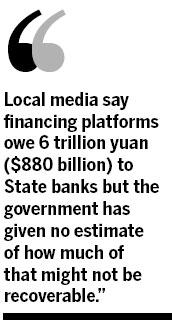 |
Large Medium Small |
BEIJING -The investment arms of Chinese local governments are being told to report how they will limit financial risks as a cleanup of the system begins, a newspaper said on Monday, amid concern banks might be hurt if they cannot repay multibillion-dollar debts.
Chinese leaders have expressed concern about the health of "financing platforms" that invest in infrastructure and real estate and borrowed heavily under Beijing's stimulus.

The central bank and three other agencies are ordering local authorities to "strengthen management work" and report how they will limit losses by the end of the year, the Shanghai Securities News said, without citing sources. It gave no details.
The order is part of "policies on the cleanup of local financial vehicles", the newspaper said.
The central bank and other agencies cited in the report did not immediately respond to requests by phone and fax for confirmation or details of the order.
Beijing ordered a nationwide review of financing agencies in May and imposed curbs in June on investment activities. Local media say financing platforms owe 6 trillion yuan ($880 billion) to State banks but the government has given no estimate of how much of that might not be recoverable.
A central bank deputy governor said in March that local finance agencies accounted for a "very high proportion" of the 9.6 trillion yuan ($1.4 trillion) lent last year by State-owned banks under orders to support the stimulus.
A State Council statement in May said better management of financing platforms was needed to maintain "economically sustainable healthy development and social stability".
China's banks are seen as the world's healthiest after avoiding the mortgage-related turmoil that battered Western institutions.
An American researcher, Victor Shih of Northwestern University, says that including finance platforms, total borrowing by local governments might be as much as 12 trillion yuan ($1.6 trillion) in 2004-09.
Beijing spent some $400 billion over the past decade clearing away non-performing loans at State-owned banks, which were long expected to lend to prop up government companies without regard to whether they could repay their debts.
That recapitalization was part of an effort to turn Chinese banks into profit-driven institutions that judged borrowers on commercial standards. But after the global crisis struck in 2008, banks were ordered to relax lending standards.
The World Bank warned in a March report that the financing platforms' growing debts was one of a series of "macro economic risks" stemming from the stimulus.
Associated Press